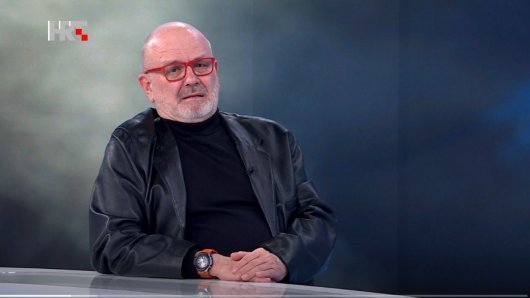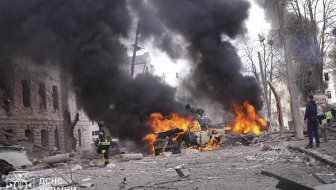The European Parliament's (EP) Rapporteur on Croatia, Hannes Swoboda, on Thursday called on members of the EP Foreign Affairs Committee to unequivocally support the signing of a Treaty on Accession of Croatia to the European Union, underlining that he did not expect any problems with the document's ratification.
I call on my colleagues to support Croatia unequivocally, Swoboda said at a meeting of the Committee on Foreign Affairs which discussed in first reading two documents - a draft resolution on the Accession Treaty with Croatia and a draft resolution on Croatia's EU membership application.
We want the ratification of the Accession Treaty to be done quickly and I see no problems in that process, Swoboda said.
He said that Croatia had achieved good results in many areas and that it deserved the green light so that the Accession Treaty could be signed in Warsaw on December 19.
He stressed that a message should be sent to the entire region that a country's EU entry is based on its own achievements.
We know that in the next few years none of the countries in the region will join the EU, currently none of them is conducting accession talks. Even when one of them begins negotiations, they will last as long as Croatia's negotiations, so it is clear that there will be no new members from the region in the next few years. That is why Croatia is important because its case shows that each country enters the EU based on its own achievements, and that each country must do its homework to meet the accession criteria, Swoboda said.
Along with the resolution whereby the EP will give its consent for the signing of the Accession Treaty, without which the document could not be signed, members of the EP will also vote on an accompanying non-binding resolution.
Swoboda said that in the non-binding resolution he wanted to draw Croatia's attention to the fact that work had not been entirely completed and that reforms should continue.
There are reform steps left that Croatia must take in the judiciary, as well as on the economic and social front and in the area of civil rights, including minority rights - and here I am not referring only to the Serb minority but to all minorities in general, including sexual minorities. We know that there have been incidents that do not show Croatia in a positive light, and we have criticised it in this parliament. Those are some of the examples Croatia needs to work more on, Swoboda said.
German Christian Democrat Bernd Posselt said he considered the vote on the EP's consent for the Accession Treaty with Croatia to be a historic event. Twenty years ago, Croatia was a place of a brutal war, more than 100,000 people were expelled from their homes, 10,000 were killed in the autumn of 1991, and the prosperous Central European town of Vukovar was razed to the ground. Today, 20 years later, we can rightfully say that this now is a historic event, said Posselt.
He said that the EU's treatment of Croatia was often that of a mother and its eighth child "on whom it wanted to correct all the mistakes made with the previous seven children."
Posselt said he would put forward a number of amendments, most of which were aimed at removing certain paragraphs so that the resolution could be as short as possible and so that it would not be critical more than necessary.
There is no EU country that has had to meet, like Croatia, so many justified and less justified criteria. I believe that the resolution should mention the critical points, but I also think that we should refrain from putting in it everything that political groups in the European Parliament consider necessary. We will vote on it two days before the elections in Croatia and we do not want to interfere in Croatia's internal matters, it is no time for a paternalist approach towards Croatia. I think that we should focus on important things and keep away from Croatia's internal affairs, Posselt said.
Now that the negotiations have been completed, we cannot ask of Croatia what we don't expect of the current members, he added.
Slovenian Liberal Ivo Vajgl, too, expressed satisfaction, saying that Croatia's completion of EU entry talks was deserved. I believe that we all agree that Croatia has deservedly come to the end of a long road and I agree that issues that were closed in the negotiations should not be reopened. One should say that Croatia has paid dearly its path to the EU and that it's fair that it has successfully reached the end of the road, said Vajgl.
German Christian Democrat Elmar Brok, too, expressed satisfaction with Croatia's completing its EU talks and its forthcoming signing of the Accession Treaty.
The Committee on Foreign Affairs will vote on Croatia on November 17 in Strasbourg, after which it will send the documents to the European Parliament which will vote on them at a plenary session on December 1. After that, the Council of the EU will officially adopt on December 5 the Draft Accession Treaty and all procedural conditions will be met for its signing.
The draft resolution, which has legal validity, reads that the European Parliament "consents to the accession to the European Union of the Republic of Croatia and notably the Council decision accepting the application for accession."
The draft resolution on Croatia's application for EU membership welcomes the completion of the entry talks which "have significantly altered the country's socio-political, economic and cultural landscape."
The document underlines the need to continue with reforms, adding that "the process is not complete but should continue with the same vigour and hard work."
Under Swoboda's draft, the European Parliament will call "on the Commission to monitor further preparations for accession with rigour and objectivity and to help the Croatian authorities fulfil their commitments and obligations entered into in the negotiations". The draft also says that "the pre-accession monitoring mechanism is a way to provide Croatia with additional support in its continued reform efforts."
The draft resolution underlines the need to focus on commitments undertaken in the area of the judiciary, fundamental rights, freedom and security, including impartial handling of war crimes cases, as well as the fight against corruption, border management, police cooperation, the fight against organised crime, competition, and the restructuring of the shipbuilding and steel industries.
It calls on Croatia to continue with judicial reforms "because an efficient judicial system is an important element for economic development and strengthens citizens' confidence in the rule of law."
The European Parliament considers it one of the highest priorities to combat corruption, particularly high-level corruption, reform the public administration, and establish law-enforcement agencies.
Croatia is urged to "continue actively to encourage and support prosecutions for war crimes and to continue cooperating with the International Criminal Tribunal for the former Yugoslavia," as well as to further encourage the return of refugees by seeking effective and sustainable ways of implementing housing and employment measures.
The European Parliament calls on Croatia to continue to maintain good neighbourly relations and actively promote regional cooperation at all levels.
It also calls "for progress in the resolution of outstanding bilateral issues with some neighbouring countries, in particular as regards border demarcation, missing persons, property restitution and refugees", noting that it "strongly believes that open issues of a bilateral nature must not halt the process of EU accession of candidate and potential candidate countries in the Western Balkans."



































